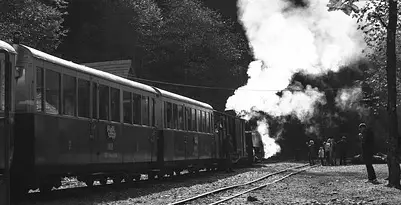| Back to Back Issues Page |
 |
|
English Detective # 109 The Great Migration that Transformed American Cities and Society July 03, 2018 |
Migration has been one of the ongoing themes of American history. Native Americans migrated to the Americas long before recorded history. From Columbus on, large groups of Spanish, English, and other Europeans began to arrive in the U.S. and the rest of the Americas (as did African slaves-- involuntary immigrants). Later immigrants came from many more European nations, as well as from Asia and Latin America. In the 19th century, many pioneers headed west to find land and opportunity.
Great Migration Vocabulary
Immigrate- to travel from one country to another. (Nouns: immigrant(s), immigration.) Integrate- to combine or blend together. Many things can be integrated, but we often refer to racial integration-- bringing different races together. Jim Crow- southern laws enforcing racial segregation between the 1870s and the 1950s. Lynch- to kill by hanging. A lynching is mob violence rather than government execution. Migrate- to make a long journey. (Nouns: migrant- a person who migrates, migration- the journey. Adjectives: migratory or migrating. Animals and birds also migrate.) Restrict- to limit (usually severely). Restriction is the noun and restrictive or restricted are related adjectives meaning limited. Segregate- to keep some people separate from others. Segregation often refers to separation by race, and the legal restrictions that go with it. Sharecroppers are people who farm on "shares." They are tenant farmers, working for the landowner for a part of the crop. Sometimes sharecroppers would owe so much money to the landowner (for the seed and tools and food he would provide before harvest) that they could never pay it all back and would need to keep working for him-- almost a form of debt slavery. P.S. If you don’t like to open links in emails, you can go to the EnglishHinks Back Issues page and open them there. It’s https://www.englishhints.com/English_Detective-backissues.html A note if you get gmail: Have you missed any issues of English Detective? if you find English Detective in your Promotions box, you can move it to your Primary box (if you want) by clicking on it and dragging it there, then clicking Yes when asked if you want to always get it in the Primary box. If you are not already getting English Detective, you can subscribe by completing the form here. (It's free!) Also, you can reach me by mail at 1752 Driftwood Drive, El Centro, CA 92243, USA. |
| Back to Back Issues Page |
